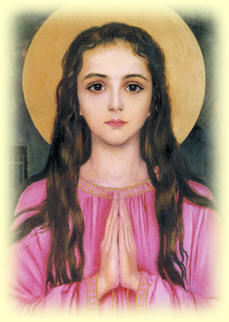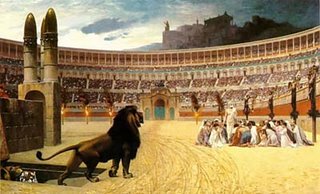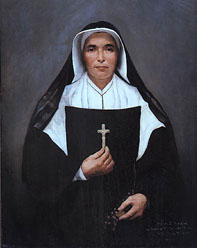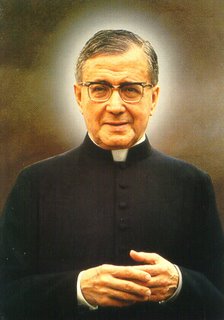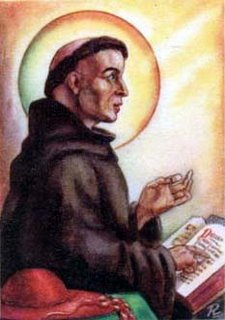
Not much is known about the early life of Giovanni di Ritella, apart from the fact that he was born in the year 1221 in Italy. It is recorded that as a child he suffered from a mysterious ailment but upon praying to St. Francis of Assisi he was miraculously healed.
Perhaps it was this healing that drew the young Giovanni towards the lifestyle and the spirituality of the Franciscans. He joined the Roman Provence of the Franciscans it was around this time that he took the name Bonaventure he was then sent to study and finish his education in Paris. It was also in Paris that he forged a life long friendship with that great saint of the Church, Thomas Aquinas.
Bonaventure was a man of astute intelligence but also had within him that element of charisma that draws people towards himself not from a longing to be popular but because of the warmth he exuded to all he met. This goes towards explaining the title that Bonaventure became known by, that of the 'Seraphic Doctor' because of his kindly but also passionate personality.
You cannot live the Franciscan charism without having a passion for life, not the passion of lusts or pleasures but of an abundant love of all things that God has created and an appreciation that leads to a spirit of joyfulness mixed with earthiness. Bonaventure was certainly not a whimsical or dreamy person by nature, rather he strode the common ground of diplomacy with energetic ability to defend the beliefs of the Catholic Church without compromising his principles or core beliefs. He was assisted in combating many heresies alongside his good friend Thomas Aquinas who with humility and great patience repudiated those who were espousing a wrong doctrine.
Bonaventure didn't have to prove anything to anyone and he didn't he simply was himself to all he met, both friend and foe alike. Nothing would change this man who gained most of his insights from many hours of contemplating the Passion of Christ and from this he gleaned that knowledge is not what counts with God, what does count is love and love alone.
Is it any wonder that an at early age Bonaventure was to become Minister General of the Franciscan Order in the year 1257. These were to be exacting years for the Franciscan Order between those who wished to remain loyal to the original Rule, while other Friars wished for the more taxing parts of the Rule to be relaxed. This inner tension would be felt by many as the warring factions parried back and forth, it would take all of Bonaventure's strength and patience to once again restore the peace of his beloved brothers.
It is during this internal wrangle that Bonaventure truly became a man after Saint Francis own heart, as with delicacy and strength he was able to reach out to both sides and unite them in their singular love of their Order and the Church. From this dispute Bonaventure would become known as the 'Second Founder' of the Friars Minor.
This was also the catalyst from which Bonaventure constructed the Constitutions and began a teaching process so that all friars would be made aware of what it means to be a Franciscan and so spread their spirituality to all who would listen. It would also arm his fellow brothers against those who were taking liberties when it came to the fundamental foundation of the Franciscan spirituality laid down by St. Francis of Assisi himself! While some were espousing a more 'elitist' form of the Order, Bonaventure with his customary good will and common sense was able to negate their influence by teaching his Franciscan brothers to maintain their spiritual integrity rather than follow the whims of those who tried to dilute what St. Francis himself taught his followers.
What kept Bonaventure grounded from becoming too puffed up with his own accomplishments was his deep and innate spirit of humility and his devotion to Christ's Passion on the Cross, from which he never tired of contemplating. Bonaventure knew that life was short so one must do good now rather than later, he also grasped that in order to love God one must live with an undivided heart, rather than find out too late that they have strayed from the path of righteousness. Bonaventure taught that in order to speak love, one has to first live it only then can one transcend the limitations of their own incompleteness.
This brilliant man did not seek honours or glory for himself, in fact he ran from such acknowledgement but though he may have eluded one title, he could not run forever and so it was that Pope Gregory X proclaimed Bonaventure as Cardinal of Albano. Though internal divisions did interrupt the Order of the Friars Minor at times it was to Bonaventure that his fellow brothers turned to help them through this most difficult process.
Because of the difficulties which was causing much heartache within the Franciscan fold, Bonaventure began to write on the true meaning of what being a true Franciscan means but also what one must become in order to truly love God as he did. His writings were prolific as he attempted to bring peace and order back to his fellow brothers and also the wider Church. Bonaventure understood then if we exclude God from our thoughts then we have also excluded God from our hearts, for what brother can harbour bitterness towards another and still believe themselves to be lovers of God?
Bonaventure understood and tried to teach his fellow Friars that with God there is no disordered love it is man himself who distorts the Beatific vision with his own pride and longing to have their own way. In order to be fully whole to each other and to be community for each other one must first look to the Crucified Christ and understand the cost it took for one human soul, this is what Bonaventure sought to teach his fellow brothers and the wider Church through his writings. He succeeded.
It was during the last few months that Bonaventure working closely with the Pope in preparation for next Ecumenical council, died suddenly from an unknown illness.
Bonaventure died in the year 1274.
Saint Bonaventure was canonized in the year 1482 by Pope Sixtus IV.
Some Quotes
"The outcome or the fruit of reading Holy Scripture is by no means negligible: it is the fullness of eternal happiness. For these are the books which tell us of eternal life, which were written not only that we might believe but also that we might have everlasting life. When we do live that life we shall understand fully, we shall love completely, and our desires will be totally satisfied. Then, with all our needs fulfilled we shall truly know the love that surpasses all understanding and so be filled with the fullness of God."
"When we pray, the voice of the heart must be heard more than that proceeding from the mouth."
Peace of Christ to ALL
Copyright © 2006 Marie Smith. All rights reserved.

